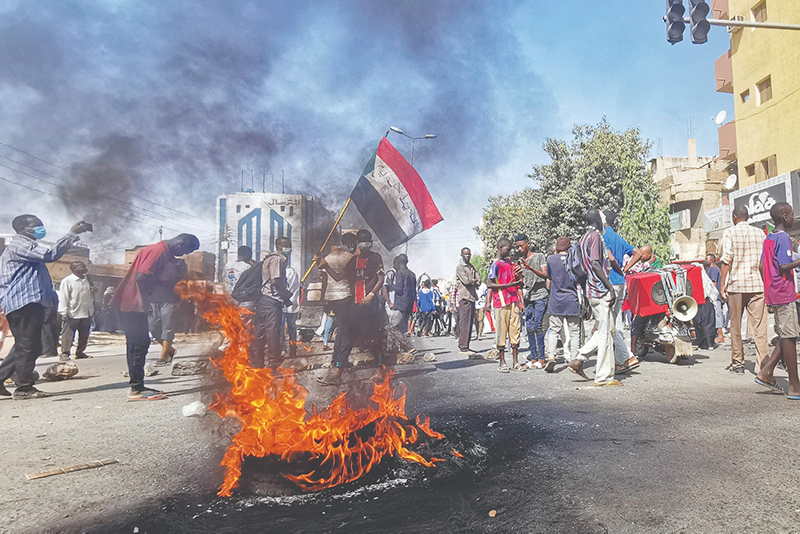KHARTOUM: Security forces fired tear gas yesterday as thousands rallied in Sudan's capital Khartoum and other cities, witnesses said, keeping up pressure on the military following a coup 11 weeks ago. The coup, led by army chief General Abdel Fattah al-Burhan on October 25, derailed a power-sharing transition between the military and civilians that had been painstakingly established in the wake of longtime autocrat Omar-al-Bashir's ouster in 2019.
Security forces fired tear gas as pro-democracy protesters headed towards the presidential palace in central Khartoum as well as in North Khartoum, witnesses said. Main streets around the capital have been sealed off to prevent people converging there and at army headquarters-the epicentre of mass demonstrations that forced Bashir out.
Protesters also rallied in Omdurman, Khartoum's twin city across the Nile, and Wad Madani to the south, witnesses said. "No, no to military rule," the demonstrators chanted as they waved the national flag.
"We will not take less than a full civilian government," said 27-year-old protester Ammar Hamed in Khartoum. The protests since the coup-one of several power grabs in Sudan's post-independence history-has been met with a crackdown that has killed at least 60 people, according to medics. Authorities have repeatedly denied using live ammunition in confronting protesters and insist scores of security forces have been wounded during demonstrations that have often "deviated from peacefulness".
Medics decry hospital raids
Medics in white coats were seen joining yesterday's rallies to protest the security forces' storming of hospitals and medical facilities during previous demonstrations. The Central Committee of Sudanese Doctors, affiliated with the protest movement, said Saturday that medics will deliver a memorandum to UN officials listing and complaining about "assaults" against such facilities.
Last week, Sudan's civilian prime minister Abdalla Hamdok resigned saying the country was at a "dangerous crossroads threatening its very survival". He had only taken his position back up on November 21, having originally been ousted along with his government in the October coup.
On Saturday, the United Nations said it would facilitate talks between key Sudanese stakeholders in a bid to resolve the crisis. But the Forces for Freedom and Change (FFC), the civilian alliance which spearheaded the protests against Bashir and became integral to the transition government, said it had not received "any details" about the UN initiative.
Yesterday, the Sudanese Professionals Association-similarly instrumental in the anti-Bashir protests-said it completely "rejected" the UN-facilitated talks. "The way to resolve the Sudanese crisis begins with the complete overthrow of the putschist military council and the handover of its members to face justice over the killings committed against the defenceless (and) peaceful Sudanese people," the SPA said in a statement.
Burhan has insisted that the October military takeover "was not a coup" but only meant to "rectify the course of the Sudanese transition". The UN Security Council is to meet on Wednesday to discuss the latest developments in Sudan. - AFP










